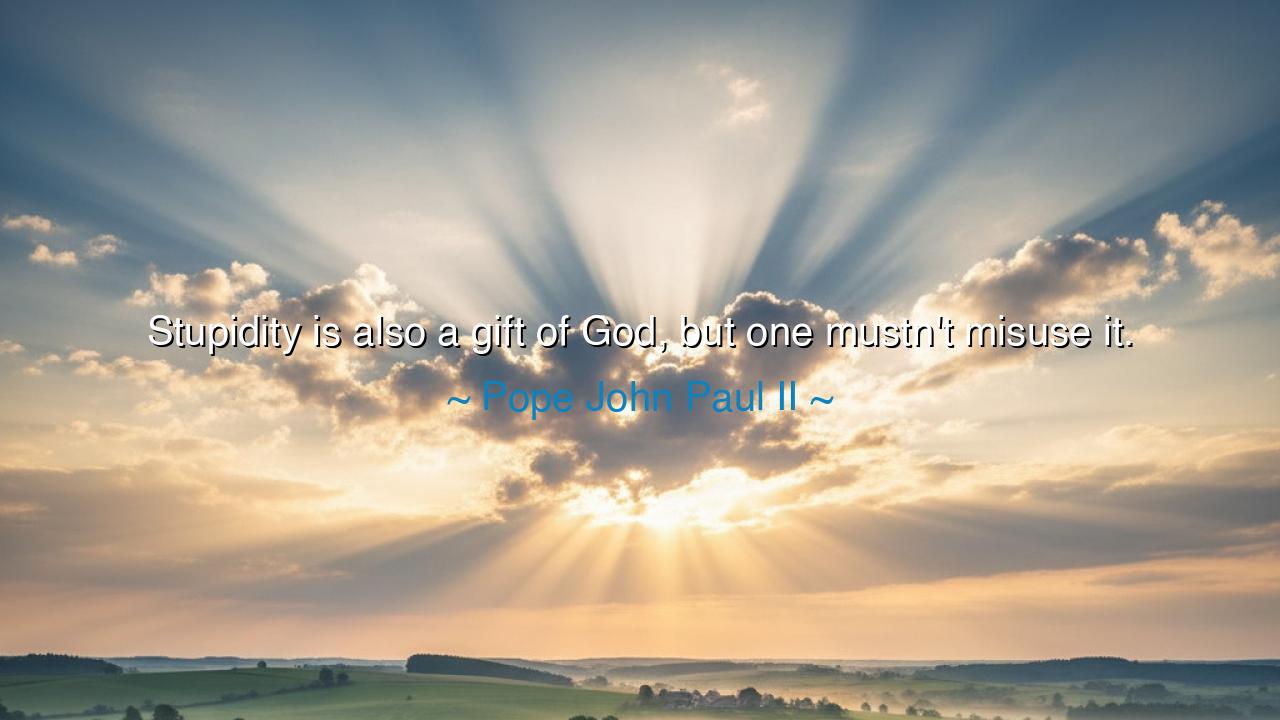
Stupidity is also a gift of God, but one mustn't misuse it.






“Stupidity is also a gift of God, but one mustn’t misuse it.” Thus spoke Pope John Paul II, a man whose wisdom was forged not in ivory towers but in the crucible of suffering, faith, and human frailty. His words, though veiled in humor, shimmer with divine insight. For the Holy Father was not mocking humanity’s foolishness — he was unveiling a paradox: that even our limitations, even our stupidity, may serve a sacred purpose when rightly understood. In these words lies a hidden truth — that humility and imperfection are gifts, but when pride, arrogance, or indifference turn them into excuses for ignorance, they become dangerous tools of ruin.
When Pope John Paul II spoke of stupidity as a gift, he spoke as one who had seen both the heights and the depths of the human soul. He had lived through tyranny — Nazi oppression, Communist control — and had watched men of great intellect commit monstrous acts. He saw that knowledge without wisdom, and intelligence without humility, often lead mankind into darkness. And so he declared, half in jest, that even “stupidity” — that simple, honest inability to know all things — could be a grace, if it keeps man aware of his dependence on God. For the truly wise know that they are not all-knowing. Thus, what we call stupidity may at times be nothing more than divine restraint, reminding us of our smallness in the face of infinite mystery.
There is beauty in not knowing everything, for it leaves space for wonder, curiosity, and faith. In his lifetime, Pope John Paul II met countless scholars, scientists, and theologians, yet he often said that the greatest wisdom he saw came from the simple-hearted — the peasant woman praying her rosary, the child who trusts without question, the poor man who shares his bread with another. Their “ignorance,” as the world would call it, was filled with a light that no philosopher could manufacture. Their lack of learning did not make them foolish; their innocence made them radiant. True stupidity, the Pope warned, is not ignorance of fact but blindness of heart — when man chooses not to see truth, even when it stands before him.
Consider the tale of Peter the Apostle, a fisherman untrained in letters, slow to understand, often rash in speech. He stumbled many times — denying his Lord, doubting himself, misunderstanding divine plans. Yet Christ chose him to be the rock upon which His Church would be built. Why? Because Peter’s “stupidity,” his human weakness, was redeemed by faith. He did not misuse it by clinging to pride or pretending to know all; he surrendered it, and through that surrender, he became strong. In this, we see the meaning of the Pope’s words — that our flaws, if offered humbly to God, can become instruments of grace.
But when man misuses stupidity, when he takes comfort in ignorance or wears it like armor against truth, then folly becomes sin. The Pope’s jest turns grave: for history bears witness to what happens when people refuse to think, to question, to seek goodness. Wars have been waged not only by the wicked, but by the thoughtless; cruelty thrives not only on hatred, but on mindless obedience. When stupidity becomes a shield against conscience — when we say “I did not know” when we could have known — it ceases to be innocent. The same gift that can keep us humble can also make us dangerous if we refuse to grow.
Thus, Pope John Paul II’s wisdom calls us to balance humility with responsibility. We must accept our ignorance with grace, but not celebrate it. We must be learners, seekers, pilgrims in pursuit of truth, yet never so proud as to think we have arrived. Our “stupidity,” our blind spots and failings, are reminders that God alone is all-wise — yet we are called to strive toward that light. The gift lies not in knowing little, but in knowing that we know little.
So, beloved listener, take these words to heart: cherish the gift of humility that comes with your imperfections. Do not despise your moments of foolishness, for they teach you patience and compassion. But never let ignorance become an idol, nor comfort in unknowing become your creed. Seek truth with gentleness; laugh at your mistakes, but learn from them. For when a man recognizes his limits and still strives toward wisdom, he honors both the gift and the Giver.
In the end, the Holy Father’s jest is a prayer: “Stupidity is also a gift of God, but one mustn’t misuse it.” May we receive that gift with humility, and use it well — not as a reason to remain blind, but as a reminder to keep our eyes open, our hearts soft, and our souls ever reaching for the light that no ignorance can darken.






AAdministratorAdministrator
Welcome, honored guests. Please leave a comment, we will respond soon